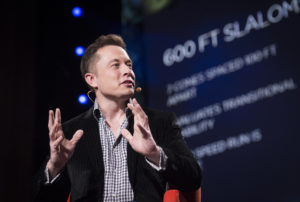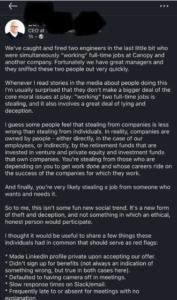
Elon Musk, serial entrepreneur, at TED2013: The Young, The Wise, The Undiscovered. Wednesday, February 27, 2013, Long Beach, CA. Photo: James Duncan Davidson
It’s commonplace for CEOs and C-suite executives to hold many titles, in addition to their primary roles. They may be the chief executive of multiple companies, like Elon Musk, sit on the boards of directors of a number of corporations or head up other organizations and entrepreneurial pursuits, such as owning a wine vineyard or startup company.
Davis Bell, the CEO of Salt Lake City-based tech company Canopy, posted on LinkedIn that he sussed out two of his software engineers who were juggling two simultaneous full-time jobs. He equated the action to stealing, lying, deceiving and cheating the shareholders.
The issue of holding down multiple jobs was raised on Reddit, LinkedIn, Blind and other platforms. While Bell restricted comments on his post, the r/antiwork subreddit on Reddit brought the issue of holding multiple jobs to the forefront. On Friday, a post made by member u/BurtMacklin09 quickly garnered more than 26k upvotes, highlighting the unfairness of executives being allowed to hold multiple roles while the average worker cannot.
Capturing the sentiment of members on the subreddit, Rakshak-1 wrote, “Plenty of CEOs have, in their time, been involved in the boards of more than one company or start up their own little side projects to grow into full on companies. It’s yet more ‘rules for thee but not for me’ bullshit. They’re free to chase whatever profit they want in whatever manner they want, but the idea of an employee being anything other than a serf bound solely to them and them alone clearly gets their blood boiling.”
The overall vibe of the social media discourse is that it is unfair and hypocritical that a CEO of a major global organization with a massive amount of responsibilities is able to take on other money-generating opportunities, whereas it’s verboten for regular workers. If you were to limit the number of jobs a person could have, C-suite executives shouldn’t be allowed to do anything else but steward the company. This is especially pertinent if the business is publicly traded and has shareholders. Many people pointed out the hypocrisy, as according to Bell’s LinkedIn profile, the CEO is also an active angel investor in a number of companies.
While it’s generally accepted practice for a CEO to hold other jobs, it’s not the same for the average white-collar worker. In this current brutal economy, characterized by runaway inflation, high costs, layoffs and an uncertain future, it would make sense for people to need or want a second job to make ends meet, especially when inflation is eating into their paycheck.
On the other end of the socioeconomic structure, the United States Department of Labor’s household survey shows an increase in people juggling multiple jobs to stay afloat and put food on the table. These folks are primarily frontline workers. They are waiting tables during the day and driving Ubers at night. It’s questionable if the various jobs are counted as one role or many, which can distort the real employment numbers. What’s clear is that there is a noticeable drop in full-time permanent jobs and an increase in part-time roles.
Don’t Tell Anyone About Holding Multiple Jobs
During the pandemic, a new remote-work trend emerged. White-collar workers, particularly in the tech sector, found a way to double their pay by working two full-time remote jobs.” According to Overemployed, proponents of this work style, say that like Fight Club, the first rule for these multi-job holders is “don’t tell anyone” and “don’t do too much work, either.”
According to Business Insider, one of the software engineers was busted after colleagues complained of poor performance. They missed meetings, did not go on camera during video calls and made their LinkedIn profiles private. Human resources found out that the person was still working for their former employer. The other engineer set off similar signals and was found out too.
Overemployed says that if you want to successfully manage holding down a number of jobs at the same time, you need to have chutzpah and be careful as to not blow up your spot. It’s helpful if you already have a steady job that you’ve been at for a while, and feel comfortable taking on additional opportunities.
You may need specialized skills that enable you to set your own schedule, minimize meetings and the ability to multitask and stay cool under pressure.
The organization behind this trend says you shouldn’t discuss working two or more remote jobs. Go into the two jobs with a goal and operate off of that goal. Is it for financial freedom? Is it to pay off your house or car? Being indecisive and losing focus of your goal is a recipe for anguish, burnout and stress. Don’t start on this journey and not know why you are doing it. Try not to get emotionally involved with the job and co-workers, as things could come to a head anytime.
Have an exit strategy. Having your exit routes all planned out will save you a lot of mental anguish. Don’t cause attention. Try to remain under the radar. Don’t add more work for yourself. Think about work dynamics from your experience. The more attention you bring to yourself, the more people will remember you. The rule here is “survive” to work another day.
People have already been doing this for years. Think of working parents who also tend to child care and sick relatives. Low-wage workers have been forced for decades to handle two or three part-time jobs to make ends meet. Unable to secure permanent full-time jobs, many Americans have had to take on multiple gig-economy jobs, driving Ubers, delivering food via DoorDash or shopping for others through Instacart. This latest trend is a white-collar, primarily tech-centered spin on trying to bring in extra income.
Source: Forbes



